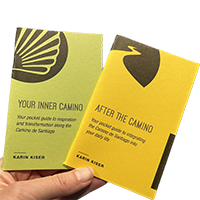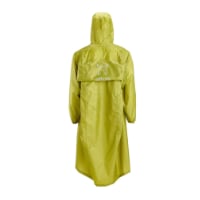- Time of past OR future Camino
- See signature.
Ok, this is meant to be sort of funny, but also practical.
On about 1/3 of my Caminos at some point, along the journey, I have suffered with diarrhea. It's not fun.
I have no clue what caused it, but I have noticed that in my latest Caminos I have not experienced it as much. I think it may be because I am more discerning with my water sources, choosing to fill up reused bottles from regular tap water devices (faucets) rather than some random fountain in a cow pasture, and regularly purchasing new bottles as well. I know it sounds like common sense, but it took me a while to learn it.
Now, should the same discomfort befall you on your next spiritual journey, its important that you learn how to pronounce "diarrhea" in a Spanish pharmacy.
Spanish pharmacies are great. The workers take their jobs very seriously. Its not like in the US when you walk into a CVS and some dork behind the counter doesn't know much. I think the workers at Spanish pharmacies take actual classes and training (or it appears so because at least they wear white coats.) If you can accurately describe your symptom (diarrhea, knee pain, cellulite on your backside, etc.) they can often sell you the appropriate remedy.
Now, I was in Ponferrada, sick out of my mind, choosing to stay at a hotel rather than an alburgue because I knew I'd be spending some extended time on the toilet. After checking in and relieved with the recently unfamiliar privacy, I decided a pharmacy was in order. NOTE: Tiendas or SuperMercados do not have the goods required to cure this or other everyday medical issues, I think the pharmacies have a union or something, or its some government regulation.
I walked into a pharmacy nearby, and proceeded to have the following dialogue while very embarrased:
Me: Hola
Pharmacist (in fancy white coat): Hola
Me: Tiene algun para [Die-a-re-ah]? (Do you have something for diarrhea?)
Pharmacist: Puzzled look.
Me: [Die-a-re-ah]
Pharmacist: Same puzzled look.
Me: (totally embarrased that this exchange has taken 2 requests but practicing Spanish) Mi mierda es como agua. (My bowel movements are like water.)
Pharmacist: Ahhhh [dee-a-ray-ah]!
Problem solved. Pills handed over. Discomfort ended.
On about 1/3 of my Caminos at some point, along the journey, I have suffered with diarrhea. It's not fun.
I have no clue what caused it, but I have noticed that in my latest Caminos I have not experienced it as much. I think it may be because I am more discerning with my water sources, choosing to fill up reused bottles from regular tap water devices (faucets) rather than some random fountain in a cow pasture, and regularly purchasing new bottles as well. I know it sounds like common sense, but it took me a while to learn it.
Now, should the same discomfort befall you on your next spiritual journey, its important that you learn how to pronounce "diarrhea" in a Spanish pharmacy.
Spanish pharmacies are great. The workers take their jobs very seriously. Its not like in the US when you walk into a CVS and some dork behind the counter doesn't know much. I think the workers at Spanish pharmacies take actual classes and training (or it appears so because at least they wear white coats.) If you can accurately describe your symptom (diarrhea, knee pain, cellulite on your backside, etc.) they can often sell you the appropriate remedy.
Now, I was in Ponferrada, sick out of my mind, choosing to stay at a hotel rather than an alburgue because I knew I'd be spending some extended time on the toilet. After checking in and relieved with the recently unfamiliar privacy, I decided a pharmacy was in order. NOTE: Tiendas or SuperMercados do not have the goods required to cure this or other everyday medical issues, I think the pharmacies have a union or something, or its some government regulation.
I walked into a pharmacy nearby, and proceeded to have the following dialogue while very embarrased:
Me: Hola
Pharmacist (in fancy white coat): Hola
Me: Tiene algun para [Die-a-re-ah]? (Do you have something for diarrhea?)
Pharmacist: Puzzled look.
Me: [Die-a-re-ah]
Pharmacist: Same puzzled look.
Me: (totally embarrased that this exchange has taken 2 requests but practicing Spanish) Mi mierda es como agua. (My bowel movements are like water.)
Pharmacist: Ahhhh [dee-a-ray-ah]!
Problem solved. Pills handed over. Discomfort ended.
Last edited:









